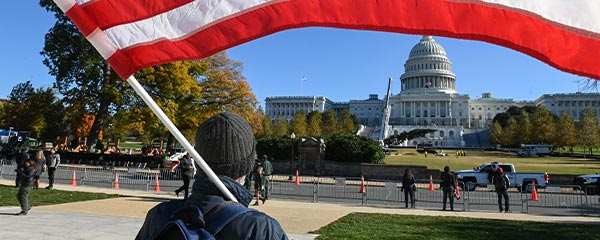Story Highlights
- Trust in judicial branch down eight points in last year
- Trust in judicial branch still highest of three branches
- Republicans mostly responsible for decline
PRINCETON, N.J. -- Americans' trust in the judicial branch of the federal government has fallen significantly in the past year, and now a record-low 53% say they have "a great deal" or "a fair amount" of trust in it. Trust in the executive and legislative branches also remains near historical lows, but both were up slightly this year.
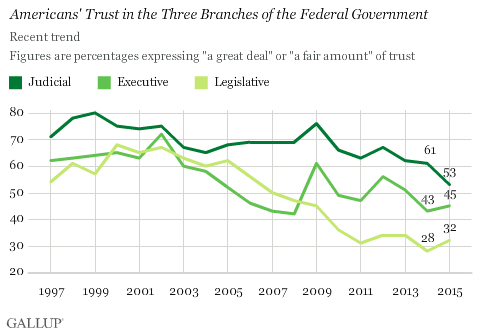
Despite this year's drop, the judicial branch retains higher public trust than either of the other branches of government -- 53%, compared with 45% for the executive branch and 32% for the legislative branch.
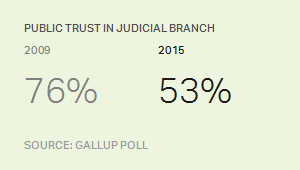
Americans have consistently had more trust in the judiciary than in the other two government branches, but trust in all three has trended downward in an era of widespread . As recently as six years ago, the first year of the Obama administration, 76% said they trusted the judicial branch, 61% said they trusted the executive branch and 45% said they trusted the legislative branch.
The results are based on Gallup's Sept. 9-13 Governance poll, which has measured trust in the three branches of the federal government annually since 2001. Gallup's extends back to 1972, with regular updates since 1997.
Trust in Judicial Branch Down Most Among Republicans
The decline in trust in the judicial branch likely stems from the Supreme Court's controversial decisions this year to legalize same-sex marriage and uphold a key provision of the Affordable Care Act allowing Americans to purchase subsidized health insurance through federally run marketplaces.
Democrats cheered those decisions while Republicans criticized them. As a result, the Supreme Court's job approval rating among Republicans in July, shortly after the high court's term ended.
In similar fashion, Republicans' trust in the judicial branch has fallen 17 percentage points since September 2014, but trust is essentially unchanged among Democrats, meaning Republicans are mostly responsible for the overall decline in trust. Independents show a modest six-point drop. Republicans' trust in the judicial branch, now at 42%, is easily the lowest for any party group in Gallup's trend.
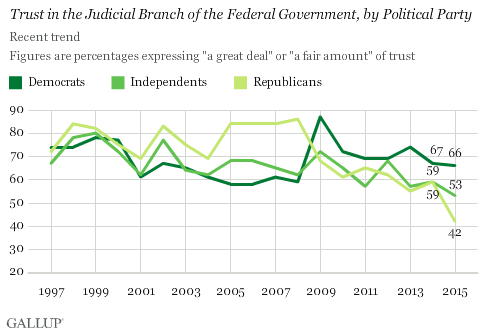
The effect of the Supreme Court's prominent left-leaning decisions is also evident in an increase in the percentage of Americans describing the court's ideology as "too liberal." Now, 37% say this, up from 30% last year and five points above the previous high in Gallup's 22-year trend. The 37% "too liberal" is also five points above the historical high of 32% who said the court was "too conservative" in 2007.
The plurality of Americans have always described the Supreme Court as "about right" ideologically, including 40% this year. Twenty percent currently say it is too conservative.
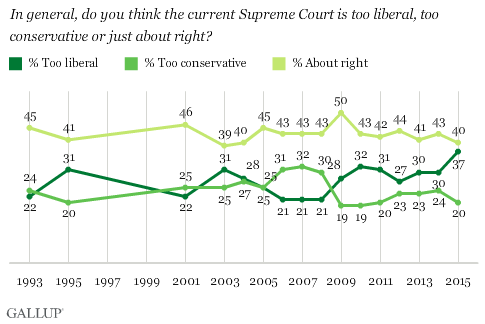
Sixty-three percent of Republicans now say the Supreme Court is too liberal, up from 51% last year. Independents also show an increase in the same direction, from 28% to 35%. Meanwhile, the percentage of Democrats who describe the Supreme Court's ideology as "about right" increased by 15 points to 54%, accompanied by an equal decline in the percentage calling it "too conservative."

Implications
Americans' trust in the judicial branch of the federal government continued to fall this year to a new low of 53%. The decline in trust in the judicial branch over the past several years partly results from broader factors affecting all institutions, namely Americans' widespread dissatisfaction with the and in the . But the decline this year is almost certainly a reaction -- primarily among Republicans -- to the Supreme Court's landmark ruling on same-sex marriage and its turning away the latest legal challenge to the Affordable Care Act.
Americans' opinions of the Supreme Court have been in recent decades, but often those reactions are short-lived. The 2015 rulings, however, appear to be sticking in Republicans' memory, nearly three months after they were handed down. Republicans' trust in the judicial branch is down sharply this year; they are significantly more likely to perceive the court as being too liberal; and still just 26% of Republicans approve of the job the court is doing in the new poll.
Republicans' trust in the judicial branch could be restored with a landmark ruling more in sync with conservative ideology and policy preferences; one possibility would be in a case on Affirmative Action in college admissions, to be heard in the coming term.
But the Supreme Court, even with the erosion in trust, remains more trusted than the executive or legislative branches. To some degree that may reflect the court's less overtly partisan role, although the decisions it makes have clear political implications for many Americans and provoke predictable reactions from those on both sides of the political aisle. Also, the Supreme Court's work is not as constant a presence in the news media as is the work of the president and Congress, which means the judiciary may get less scrutiny than the other branches of the government.
Historical data are available in .
Survey Methods
Results for this 优蜜传媒poll are based on telephone interviews conducted Sept. 9-13, 2015, with a random sample of 1,025 adults, aged 18 and older, living in all 50 U.S. states and the District of Columbia. For results based on the total sample of national adults, the margin of sampling error is ±4 percentage points at the 95% confidence level. All reported margins of sampling error include computed design effects for weighting.
Each sample of national adults includes a minimum quota of 60% cellphone respondents and 40% landline respondents, with additional minimum quotas by time zone within region. Landline and cellular telephone numbers are selected using random-digit-dial methods.
View survey methodology, complete question responses and trends.
Learn more about how works.
